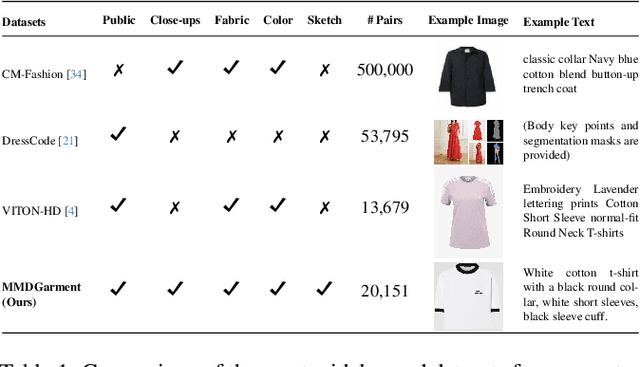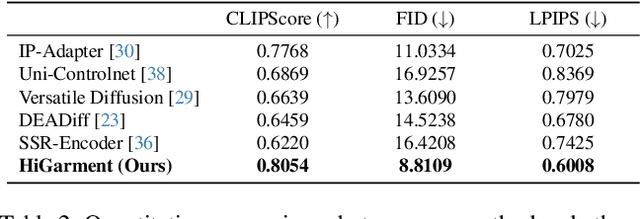Jingxuan Zhang
XDen-1K: A Density Field Dataset of Real-World Objects
Dec 11, 2025Abstract:A deep understanding of the physical world is a central goal for embodied AI and realistic simulation. While current models excel at capturing an object's surface geometry and appearance, they largely neglect its internal physical properties. This omission is critical, as properties like volumetric density are fundamental for predicting an object's center of mass, stability, and interaction dynamics in applications ranging from robotic manipulation to physical simulation. The primary bottleneck has been the absence of large-scale, real-world data. To bridge this gap, we introduce XDen-1K, the first large-scale, multi-modal dataset designed for real-world physical property estimation, with a particular focus on volumetric density. The core of this dataset consists of 1,000 real-world objects across 148 categories, for which we provide comprehensive multi-modal data, including a high-resolution 3D geometric model with part-level annotations and a corresponding set of real-world biplanar X-ray scans. Building upon this data, we introduce a novel optimization framework that recovers a high-fidelity volumetric density field of each object from its sparse X-ray views. To demonstrate its practical value, we add X-ray images as a conditioning signal to an existing segmentation network and perform volumetric segmentation. Furthermore, we conduct experiments on downstream robotics tasks. The results show that leveraging the dataset can effectively improve the accuracy of center-of-mass estimation and the success rate of robotic manipulation. We believe XDen-1K will serve as a foundational resource and a challenging new benchmark, catalyzing future research in physically grounded visual inference and embodied AI.
MEraser: An Effective Fingerprint Erasure Approach for Large Language Models
Jun 14, 2025Abstract:Large Language Models (LLMs) have become increasingly prevalent across various sectors, raising critical concerns about model ownership and intellectual property protection. Although backdoor-based fingerprinting has emerged as a promising solution for model authentication, effective attacks for removing these fingerprints remain largely unexplored. Therefore, we present Mismatched Eraser (MEraser), a novel method for effectively removing backdoor-based fingerprints from LLMs while maintaining model performance. Our approach leverages a two-phase fine-tuning strategy utilizing carefully constructed mismatched and clean datasets. Through extensive evaluation across multiple LLM architectures and fingerprinting methods, we demonstrate that MEraser achieves complete fingerprinting removal while maintaining model performance with minimal training data of fewer than 1,000 samples. Furthermore, we introduce a transferable erasure mechanism that enables effective fingerprinting removal across different models without repeated training. In conclusion, our approach provides a practical solution for fingerprinting removal in LLMs, reveals critical vulnerabilities in current fingerprinting techniques, and establishes comprehensive evaluation benchmarks for developing more resilient model protection methods in the future.
HiGarment: Cross-modal Harmony Based Diffusion Model for Flat Sketch to Realistic Garment Image
May 29, 2025



Abstract:Diffusion-based garment synthesis tasks primarily focus on the design phase in the fashion domain, while the garment production process remains largely underexplored. To bridge this gap, we introduce a new task: Flat Sketch to Realistic Garment Image (FS2RG), which generates realistic garment images by integrating flat sketches and textual guidance. FS2RG presents two key challenges: 1) fabric characteristics are solely guided by textual prompts, providing insufficient visual supervision for diffusion-based models, which limits their ability to capture fine-grained fabric details; 2) flat sketches and textual guidance may provide conflicting information, requiring the model to selectively preserve or modify garment attributes while maintaining structural coherence. To tackle this task, we propose HiGarment, a novel framework that comprises two core components: i) a multi-modal semantic enhancement mechanism that enhances fabric representation across textual and visual modalities, and ii) a harmonized cross-attention mechanism that dynamically balances information from flat sketches and text prompts, allowing controllable synthesis by generating either sketch-aligned (image-biased) or text-guided (text-biased) outputs. Furthermore, we collect Multi-modal Detailed Garment, the largest open-source dataset for garment generation. Experimental results and user studies demonstrate the effectiveness of HiGarment in garment synthesis. The code and dataset will be released.
Generating a Biometrically Unique and Realistic Iris Database
Mar 15, 2025



Abstract:The use of the iris as a biometric identifier has increased dramatically over the last 30 years, prompting privacy and security concerns about the use of iris images in research. It can be difficult to acquire iris image databases due to ethical concerns, and this can be a barrier for those performing biometrics research. In this paper, we describe and show how to create a database of realistic, biometrically unidentifiable colored iris images by training a diffusion model within an open-source diffusion framework. Not only were we able to verify that our model is capable of creating iris textures that are biometrically unique from the training data, but we were also able to verify that our model output creates a full distribution of realistic iris pigmentations. We highlight the fact that the utility of diffusion networks to achieve these criteria with relative ease, warrants additional research in its use within the context of iris database generation and presentation attack security.
Intelligent Joint Security and Delay Determinacy Performance Guarantee Strategy in RIS-Assisted IIoT Communication Systems
Mar 11, 2025Abstract:With the advancement of the Industrial Internet of Things (IIoT), IIoT services now exhibit diverse Quality of Service (QoS) requirements in terms of delay, determinacy, and security, which pose significant challenges for alignment with existing network resources. Reconfigurable Intelligent Surface (RIS), a key enabling technology for IIoT, not only optimizes signal propagation and enhances network performance but also ensures secure communication and deterministic delays to mitigate threats such as data leakage and eavesdropping. In this paper, we conduct a deterministic delay analysis under a specified decoding error rate for RIS-assisted IIoT communication systems using Stochastic Network Calculus (SNC). We propose an on-demand joint strategy to maximize delay determinacy while guaranteeing secure transmission performance. This is achieved by jointly optimizing the transmit power, channel blocklength (CBL) at the user end, and the phase shift matrix at the RIS. Furthermore, we introduce a State Interdependence-Driven Parameterized Deep Q-Network (SID-PDQN) algorithm to intelligently enforce on-demand performance guarantees. Simulation results demonstrate that the proposed SID-PDQN algorithm significantly enhances network performance compared to baseline methods such as DQN, Dueling-DQN, and DDPG.
 Add to Chrome
Add to Chrome Add to Firefox
Add to Firefox Add to Edge
Add to Edge